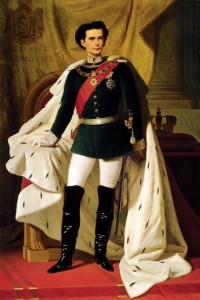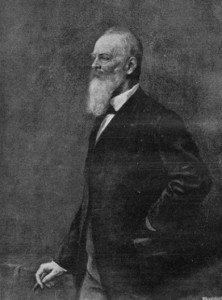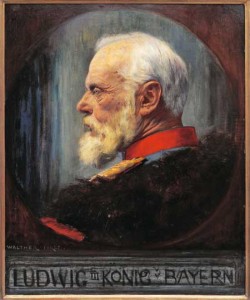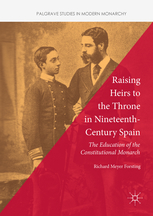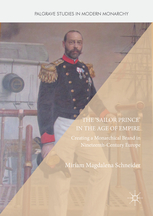see also: Ludwig of Bavaria and Helmstadt
“Beware of this Man in Germany, he is dangerous and deceitful!”
Prince Ludwig of Bavaria as a Reichsfeind
Frank Lorenz Müller
The 19th century was an age marked by some enormously long monarchical reigns. Even against this background, though, the length of Prince Ludwig’s wait for the Bavarian throne was nothing if not epic. By the time he eventually assumed royal power in Munich in 1912, his sparse white hair, white beard and portly appearance made him look every one of his 68 years. His path to the crown had not exactly been straightforward. Born in January 1845 Ludwig was the son of Prince Luitpold, the younger brother of King Maximilian II. Yet since the king’s marriage had remained childless for more than two years, Luitpold’s first-born briefly seemed headed for a future on the throne. Hopes of a direct succession were quickly dashed, though, when, only seven months later, Maximilian’s wife Friederike was safely delivered of a crown prince – also called Ludwig. The older Ludwig’s mother, Auguste Ferdinande, an ambitious Habsburg princess, could not contain her disappointment. “Up till now you were something,” she acerbically cooed into her infant son’s cradle upon receiving the news of the royal birth; “now, you are nothing anymore.”
But this was not the end of Prince Ludwig’s long and twisted royal road. In 1864 he witnessed his eighteen year-old cousin accede to the throne. Two years later, when Bavaria fought alongside Austria in the war against Prussia, the prince found himself on the front line. The bullet that embedded itself in Ludwig’s thigh during a skirmish near the Franconian village of Helmstadt eluded all surgical attempts at removing it. The piece of Prussian lead remained a painful souvenir of a lost war for the rest of his life and contributed to making Ludwig a most unenthusiastic soldier. In stark contrast to the increasingly eccentric behaviour displayed by his royal cousin and namesake, Prince Ludwig went on to build a life of exemplary if dull dynastic probity. His marriage to Marie Therese of Austria-Este produced 13 children. As the proud owner of the model farm at Leustetten, Ludwig became a widely recognised specialist in matters agricultural and he campaigned tirelessly for the improvement of the country’s antiquated infrastructure. The devout Catholic also discharged his duties as a member of the upper chamber of the Bavarian parliament with unceasing assiduity.
The year 1886 was to change Prince Ludwig’s future dramatically. For years the political establishment in Bavaria had grown concerned about King Ludwig’s pathological reclusiveness, his reckless spending on gargantuan building projects and his predatory homosexual behaviour. Now a decision was taken to grasp the nettle. He was removed from the throne on the grounds of insanity. While the royal title was to remain with the deposed king – and would then, after King Ludwig’s mysterious drowning two days later, devolve unto his unquestionably incapacitated younger brother Otto – his monarchical functions were assumed by the unhappy brothers’ venerable uncle – Prince Luitpold. As the eldest son of this 65 year-old regent, 41 year-old Prince Ludwig suddenly found himself closer to the throne than he had been since receiving the bad news in August 1845. And it showed. He immediately redoubled his efforts to gain popularity by travelling the length and breadth of the country, addressing farmers, singers and writers, as well as generally waxing lyrical about the unparalleled record of the Wittelsbach dynasty.
That all this hard work paid off was revealed by the warm expressions of affection that poured in from all over Bavaria on the occasion of Ludwig and Marie Therese’s Silver Anniversary in 1892. As the future monarch he also attracted attention from further afield: the German Emperor Wilhelm I considered it advisable to flatter the Bavarian prince and Bismarck immediately agreed Ludwig’s request to be saluted with just as many naval guns as a Prussian prince. This somewhat petty issue, which occupied the admiralty, the German chancellor, the Prussian Foreign Office and the Bavarian government within months of the death of King Ludwig, was a sign of things to come. For in the course of the ensuing decades, during which the world marvelled at the indestructible health of the ancient regent Luitpold, his impatient and cash-strapped son Ludwig grew increasingly crabby. In private, his general grouchiness damaged his relationship with his eldest son Rupprecht, but publicly it discharged itself through ill-tempered complaints about the alleged lack of respect accorded to Bavaria and her ruling house within the German Reich.
The reduction in sovereignty and general loss of status that accompanied Bavaria’s entry into the German Reich in 1871 was a bitter pill for the proud and ancient Wittelsbach dynasty. King Ludwig II, whose reluctant approval had been extracted by applying enormous political pressure as well as lavish bribes, never fully accepted his relegation. He escaped from the consequences of his actions by drifting into a world of fantasy and self-indulgence. Prince Ludwig reacted differently, but his views were much the same. In a long speech to the Bavarian upper chamber in December 1870 he grimly listed all the injustices and missed opportunities that had led to the current situation and then, through gritted teeth, announced that he would vote for the treaties now proposed – “but truly not with a light heart.” The main reason for this, he explained, was his fear that the country would otherwise be forced to accept “much worse conditions”. Hardly a warm welcome for the German Reich!
In the years that followed Prince Ludwig made a number of attempts to prettify his grudging toleration of the status quo – an inescapable dictate of realpolitik – by adding the flimsy garlands of an all-German loyalty. His gestures never escaped the eagle eyes of the Prussian envoys posted in Munich, but their reports to Berlin tended to be laced with a generous helping of scepticism. In 1885 Ludwig assured the Prussian diplomat von Werthern on a number of occasions that he was keenly interested in “our” German fleet. The unusual name “Helmtrud”, with which he had saddled his unfortunate new daughter, the prince explained in the following year, had been chosen to honour Emperor Wilhelm through the use of the second syllable of his name. A speech Ludwig gave in August 1888 attracted attention because of its “German sentiment”, but, the Prussian envoy added, it was probably too early to take this as evidence of a change in attitude. When, in 1897, Emperor Wilhelm II stage-managed a nation-wide series of celebrations to mark the centenary of his late grandfather’s birth, Prince Ludwig dutifully attended the various Munich events and even chose to speak at one of them. Such good behaviour struck the Prussian envoy as remarkable. But these moments smacked of insincerity. His Highness had been utterly affable towards him, the Prussian envoy Count Monts observed in 1900: “the usual, unmistakeable sign of a guilty conscience.” The Wittelsbach prince simply appeared to be protesting too much when, as in 1910, he sought to flatter Wilhelm II by calling him a “true friend” and the “main force” behind the creation of the German navy; all the more so since, on this occasion, he could not help adding: “naturally with the help of all the German monarchs and the representation of the German people.”
When the Kaiser read an account of this event, he scribbled a baffled “Hello??!” on the margin of the report. By the standard of Wilhelm II’s usual remarks on the heir to the Bavarian throne, this was an unusually mild reaction. Commenting on one of Ludwig’s speeches in May 1900, he accused the Bavarians of behaving not like brothers, but like “distant cousins.” A few days later he added a few lines to a report from Munich. The late Archduke Rudolf of Austria had once warned him against Ludwig, he wrote: “Beware of this Man in Germany, he is dangerous and deceitful!” Four years earlier the emperor had telegraphed Chancellor Hohenlohe to accuse Ludwig of “unpatriotic and un-German behaviour.” Each of these imperial vituperations was triggered by an unwelcome public demonstration on the part of Ludwig. These éclats were perceived as substantiating the belief, tirelessly confirmed by Count Monts, that the prince was a dyed-in-the-wool Ultramontane, firmly in the grip of Wittelsbach hubris and pathologically jealous of Prussia’s Hohenzollern dynasty.
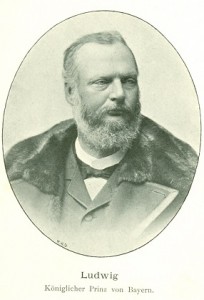 While his attitude may have made him a beacon of hope for Catholic particularists and the future co-operator with the Centre Party, Ludwig certainly gave his Prussian detractors much to work with. His most famous outburst occurred in the full glare of an international celebration. In June 1896 the prince travelled to Moscow to represent his father at the coronation of Tsar Nicholas II. At a garden party organised by the city’s German community, some hapless functionary offered a toast in honour of Prince Henry of Prussia – the Kaiser’s younger brother, who attended on behalf of the Prussian monarch – and the German princes who had travelled to Russia “in his entourage”. Before the raised glasses could be emptied, however, Prince Ludwig intervened indignantly. The German princes were not vassals of the Kaiser, but his allies, he snapped at the speaker, and Prussia owed them a great deal – including the imperial crown. While the icy silence that ensued and Prince Henry’s swift exit made clear that he had caused offence, Ludwig showed only scant remorse. Even when forced to visit the Kaiser in person to rectify the situation a few weeks later, the Bavarian prince still complained that Germany’s non-Prussian princes, were often unjustly treated like vassals. The Kaiser may have crowed about having forced Ludwig to “go to Canossa”, but Catholic and particularist circles and their newspapers celebrated the gutsy Wittelsbacher for clarifying that Bavaria would give the Reich its due – but no more. The “Moscow Incident” made the headlines not just in Germany, but in Russia, Austria, France and Switzerland with questions being asked about the unity of the Reich.
While his attitude may have made him a beacon of hope for Catholic particularists and the future co-operator with the Centre Party, Ludwig certainly gave his Prussian detractors much to work with. His most famous outburst occurred in the full glare of an international celebration. In June 1896 the prince travelled to Moscow to represent his father at the coronation of Tsar Nicholas II. At a garden party organised by the city’s German community, some hapless functionary offered a toast in honour of Prince Henry of Prussia – the Kaiser’s younger brother, who attended on behalf of the Prussian monarch – and the German princes who had travelled to Russia “in his entourage”. Before the raised glasses could be emptied, however, Prince Ludwig intervened indignantly. The German princes were not vassals of the Kaiser, but his allies, he snapped at the speaker, and Prussia owed them a great deal – including the imperial crown. While the icy silence that ensued and Prince Henry’s swift exit made clear that he had caused offence, Ludwig showed only scant remorse. Even when forced to visit the Kaiser in person to rectify the situation a few weeks later, the Bavarian prince still complained that Germany’s non-Prussian princes, were often unjustly treated like vassals. The Kaiser may have crowed about having forced Ludwig to “go to Canossa”, but Catholic and particularist circles and their newspapers celebrated the gutsy Wittelsbacher for clarifying that Bavaria would give the Reich its due – but no more. The “Moscow Incident” made the headlines not just in Germany, but in Russia, Austria, France and Switzerland with questions being asked about the unity of the Reich.
In 1900 Ludwig was on the warpath again. He gave a speech in Straubing in which he rejected the notion that Bavaria’s membership of the Reich was the result of a gracious act and instead insisted that German unity had been “welded together with Bavarian blood just as much as with the blood of other German tribes [Stämme].” Once again the reaction was wholly predictable. While Prussian and liberal voices condemned the prince’s harsh words about the allegedly strained relationship between Bavaria and North Germany, Catholic papers lionised the “hero of Straubing.” Fully aware of the attention Prince Ludwig’s words were attracting in the international press, the Kaiser fumed at the “tort now done abroad” and joined “all true patriots” in their wish never to see Ludwig as Bavaria’s ruler.
Such views were certainly reinforced by the latter’s very emphatic public professions of his Catholic faith – an issue with obvious and powerful political connotations. After attending mass in Altötting in September 1910, Ludwig publicly stated his conviction that Catholicism was “the only true and genuine religion” and thanked the Almighty for making him the child of Catholic parents and for having been brought up within the Catholic faith. Once again, there was a lively press echo across the whole of Germany. While liberal papers attacked the intolerance of a religious zealot, the Catholic “Germania” hoped that “Prince Ludwig’s creed may reverberate in Catholic hearts everywhere and inspire emulation.”
All this squabbling between Ludwig and the Prussians, between pro-Reich liberals and particularist ultramontanists took place against the quiet and steady background of ancient Prince Luitpold’s low-key stewardship of the kingdom of Bavaria. Unlike his son, the prince-regent did not seem to chafe too badly under the Reich, kept away from controversial topics, rarely gave speeches and let it be known discreetly that he was embarrassed by the bouts of ill feeling stirred up by Prince Ludwig. Luitpold successfully cultivated an image of modest dignity which eventually won him considerable respect and affection. The prince-regent’s remarkable fitness had long been favourably compared with his son’s prematurely aged appearance, but, with the passing of the decades, his great age was taking its toll. Round about the time of his 90th birthday some people cruelly quipped that Luitpold was already dead, but that no-one had the courage to tell the old gentleman for fear of over-exciting him. The inevitable eventually happened in December 1912 and Prince Ludwig succeeded his father first as prince-regent and then, after some nimble legal footwork had solved the tricky problem of poor King Otto’s continued existence, even as king of Bavaria.
A seasoned and politically active operator, with the scars to prove it, King Ludwig III made a competent and generally well-received start to his reign, fulfilling his duties knowledgeably and conscientiously. He also began a massive effort at popularising and legitimising the monarchy through the use of media and a clearly recognisable desire to gain approval. In so doing, he benefited from and contributed to the Wittelsbach dynasty’s success in generating a broad political culture within which almost all sections of Bavarian society could be seen as fundamentally pro-monarchy. His noisy insistence on Bavaria’s specific rights and her rank within the Reich may well have played a positive role in this process. By extension, it was the accusation of Ludwig’s excessive subservience to the Supreme Warlord in Berlin that probably fuelled his unpopularity during the First World War more than anything else. Too closely identified with a war that had caused untold suffering, the last king of Bavaria was eventually swept away in November 1918 by the people’s yearning for peace. Along with him went the monarchical system in Bavaria and across the whole German Reich.
Suggested further reading:
Beckenbauer, Alois, Ludwig III. von Bayern 1845-1921. Ein König auf der Suche nach seinem Volk (Regensburg, 1987)
Schmid, Alois and Katharina Weigand (eds), Die Herrscher Bayerns (Munich, 2001)
März, Stefan, Das Haus Wittelsbach im Ersten Weltkrieg. Chance und Zusammenbruch monarchischer Herrschaft (Regensburg, 2013)
Möckl, Karl, Die Prinzregentenzeit. Gesellschaft und Politik während der Ära des Prinzregenten Luitpold in Bayern (Munich-Vienna, 1972)
Weiß, Dieter J., Kronprinz Rupprecht von Bayern. Eine politische Biographie (Regensburg, 2007)

